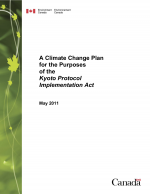Some people know that spring is turning into summer when they open the cottage or make the season's first trip to the Dairy Queen. Here at the Pembina Institute, we look for the publication of the federal government's Kyoto Protocol Implementation Act plan as a sign that summer is almost here.
Unfortunately for us, our summertime ritual is always a lot less entertaining than devouring that first ice cream cone of the season — and this year's experience is no exception.
Some quick background before getting to the contents of this year's report: the Kyoto Protocol Implementation Act started out as a private member's bill championed by Liberal Member of Parliament Pablo Rodriguez. It became law in 2007 with unanimous support from the opposition parties in the minority Parliament of the time, although Conservative MPs voted against it every step of the way.
The law requires the government to take steps to reduce Canada's greenhouse gas (GHG) emissions in line with our Kyoto target. While there's now no chance that Canada will hit that target, the law also sets up an accountability regime that the government does largely comply with. That includes a requirement to report annually on its climate change policy intentions by May 31, and to table that plan in Parliament.
It's worth noting upfront one caveat from the plan's introduction, which is that the report is not a "comprehensive inventory" of federal climate change actions. Instead, it only covers policies that will take effect during the current phase of the Kyoto Protocol, which runs from 2008 to 2012.
But even with that in mind, the plan makes for demoralizing reading. By 2012, the report estimates, all federal government measures will reduce Canada's annual emissions by nine million tonnes (Mt), relative to a "business-as-usual" emissions level. Canada's total 2012 emissions are projected to be 740 Mt, so the federal government plans to shave just over one per cent off that total by 2012.
 The report also compares its projections to Canada's actual emissions for 2009, the most recent year of data available. It concludes that all federal actions accounted for just four Mt of emission reductions in 2009. That's less than one per cent of Canada's total emissions in 2009 (which were 690 Mt), and just under 10 per cent of the drop in Canada's emissions from 2008 to 2009, which totalled 42 Mt.
The report also compares its projections to Canada's actual emissions for 2009, the most recent year of data available. It concludes that all federal actions accounted for just four Mt of emission reductions in 2009. That's less than one per cent of Canada's total emissions in 2009 (which were 690 Mt), and just under 10 per cent of the drop in Canada's emissions from 2008 to 2009, which totalled 42 Mt.
(Interestingly, the summary of Canada's National Inventory Report — another springtime publication that generated some controversy last week — says on page six that "[a]ltogether, the major federal GHG reduction initiatives already in place may, by 2009, have been contributing on the order of 25-40 Mt of annual greenhouse gas emission reductions."
It's not clear how that statement lines up with what's in the Kyoto Protocol Implementation Act plan, which gives the government credit for up to 10 times less emission reduction success in 2009. Both documents were published by Environment Canada, and released less than a month apart.)
Of the 20 programs the federal government has implemented, the report shows that 14, or 70 per cent, will end by 2012. That includes the three most successful programs for reducing emissions in 2009, which were:
- The ecoENERGY for Renewable Power Program, which accounted for 2.19 Mt of reductions in 2009. (Although the program will continue to pay incentives to existing renewable power producers until 2021, it has run out of funding to support new projects.)
- The ecoENERGY for Industry program, which gets credit for 1.02 Mt of reductions in 2009 and ended on March 31 of this year.
- The ecoENERGY for Buildings and Homes program, responsible for 0.99 Mt of reductions in 2009, also ended on March 31 of 2011.
While many of the programs described in the report have modest ambitions, the report's authors make the case that they have been largely meeting their goals. As of now, there's very little on the horizon to replace them.
It's true that the government has committed to adopt sector-by-sector emission regulations, but Environment Canada's flagship sectoral regulation to date — covering emissions from passenger cars and trucks — is projected to generate just 0.45 Mt of reductions by 2012. (Pembina's analysis suggests that it might not do much better in later years either.)
To put that 0.45 Mt number for vehicle regulations in context, hitting Canada's 2020 target requires reducing annual emissions by over 80 Mt from today's level of 690 Mt.
Instead, the Kyoto Protocol Implementation Act report projects that emissions will grow from their current level to 731 Mt by 2012, even with all federal and provincial efforts factored in.
And after 2012, we won't even have the spring ritual of a Kyoto "plan" from the government to provide accountability to their efforts. That's not for lack of trying: opposition party MPs passed a bill that would have continued the transparency of the Kyoto law, but Conservative Senators voted it down last fall.
Countries gathered this week for another June ritual in the climate world, the annual international climate talks in Bonn, Germany. To many of them, Canada is known mainly as a country that accepted a Kyoto emissions target and then walked away from it. This year's climate plan under the Kyoto Protocol Implementation Act confirms that legacy and goes a step further, showing that we're set to re-create that experience with the government's 2020 target.
We've said it before, and we'll say it again: Canada can do so much better. But that's not going to happen unless the federal government gets a lot more serious about its climate policy plans.








